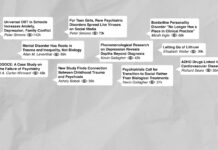One of Mad In America’s biggest challenges, ever since our founding as a webzine in February of 2012, has been this: How do we create a forum for exploring critical psychiatry perspectives, which naturally will include opinions and thinking that will seem quite radical to many, while trying to reach as wide an audience as possible? If your mission is to promote a fundamental rethinking of psychiatry, how do you reach beyond the “choir” and invite the general public into the discussion?
While this is not easily done, partly because this whole subject is so contentious, we have sought to continually expand our audience ever since our founding. Our webzine features research news, personal stories, and blogs written by people with a diversity of experience and “expertise”: peer activists, family members, therapists, psychiatrists, researchers, lawyers, journalists, and so forth. We also invited readers to add their voices to the community discussion, which is why our front page features a running log of the latest comments.
We then expanded our activities beyond the webzine with that goal in mind: how do we reach larger audiences? Our film festival in 2014 sought to explore the power of film to tell “critical psychiatry” narratives. We developed Mad in America Continuing Education as a way to promote research findings that, in a universe dominated by pharmaceutical interests and psychiatry’s guild interests, are not usually promoted to the medical community (and the general public). And we have worked with critical psychiatry folks in other countries to set up affiliate sites, which fits with the mission of promoting critical psychiatry perspectives to a broader audience.
We are now launching a new effort of this sort, one that has us excited about its possibilities. MIA Radio will begin airing podcasts on July 1. We will be both producing our own MIA podcasts and serving as a host for independently produced critical psychiatry podcasts.
We are very fortunate to have James Moore leading this initiative. James, who is from the UK, has been producing the popular “Let’s Talk Withdrawal” podcasts for some time. Listeners know him as a great interviewer, who is always well-informed about the work of the person he is interviewing and the larger issues involved.
James will be hosting a weekly MIA podcast that, in essence, will follow in the footsteps of his Withdrawal podcasts. Our news editor, Justin Karter, and his team of correspondents from UMASS Boston’s Clinical Psychology program, will produce a monthly science podcast. Kermit Cole, who for a long time was the editor of our webzine, will develop a series of podcasts that explore dialogical practices and other non-drug approaches for responding to psychiatric crises (such as the Hearing Voices Network).
In addition, we hope to use the MIA platform to help independently produced critical psychiatry podcasts expand their reach. There are many well-known figures in the critical psychiatry world who are producing terrific shows, and by promoting them as “affiliates” on our site, we hope to amplify their reach. The first such podcast that will appear as an affiliate on our site is Will Hall’s Madness Radio.
The one thing we have learned during the past five years is that each “information channel” builds on the other, in terms of creating a broader audience for the “critical psychiatry” narrative. The different channels reach different groups, and each has its own special kind of impact. A webzine provides an intellectual (and emotional) framework for the entire discussion; films may provide a particularly memorable emotional impact; continuing education courses create a learning environment; and global affiliates provide a sense of community, which transcends national politics.
Radio podcasts, I believe, add something new. They provide a chance to hear people in the critical psychiatry world think, and of course we get to hear the tone of their voices, which creates a very intimate experience for the listener. Radio can create a communal sense of caring about an issue, which can move mind and spirit in novel ways.















So exciting, Bob! Way to go, to keep growing and expanding this endeavor !! Do not stop until all of psychiatry and its damaging ways are gone forever. I’ve heard some of James Moore’s work- he is excellent.
As always, on behalf of all of humanity, I thank you.
Report comment
Hi erin321, thanks so much for your feedback, I’m very excited to share the podcast with you all and I hope it makes a small contribution to the excellent work of this community.
Report comment
This is excellent news.
Perhaps MIA RADIO might provide a means to inform and alert to danger, those not yet damaged and destroyed, (or dead) from psychotropic prescription drugs.
A warning pre-drug injury for those unwise enough to believe in, and trust that licensed drugs are “safe and effective”. To those who assume that fraudulent clinical trials produce “evidence based prescribing”
To warn of the most serious ADRs of SSRIs/SNRIs and “antipsychotics” AKATHISIA and its related iatrogenic suicide and violence at all ages.
MIA RADIO might possibly afford an educational role in alerting prescribers to the depth and duration of the psycho-pharmaceutical marketing deception and the withholding of critical toxicity data.
Also – The failure of regulators to address patient safety.
Perhaps eventually to accurately inform those many prescribers who still perpetuate the fantasy of the chemical imbalance.
Thank you Robert.
TRM 123. Retired Consultant Physician.
Report comment
Hi TRM123, I’m very grateful for your feedback and I also hope that the podcast will add to the excellent, mind expanding dialog and discussions that happen within this community. I agree that there is potential for the podcasts to be used as an educational tool, thank you for the suggestion. I’m looking forward to sharing the first episodes with you all.
Report comment
Just listened to the “teaser” podcast James.
This is going to be a powerful and valuable asset and resource for all those injured by psychotropic drugs, and/or those who had to watch our loved ones lives destroyed by such catastrophic prescriber ignorance and denial.
TRM 123.
Report comment
Thanks so much TRM 123, it’s amazing how powerful it is to hear the raw emotion of these experiences and I very much hope that the podcast will add to the vital work undertaken by this community.
Report comment
The nefarious bob Whitaker expanding his reach!
Report comment
Omg – the nefarious agents quip! That is not ever going to stop being funny!
Report comment
Great news! Thanks for sharing! This roll out should be successful and I anticipate this project will expand the MIA audience significantly because of the good design and planning.
In particular, I like that it builds on existing radio shows and considers them as affiliates, not competitors. Don’t forget to invite MindFreedom International which has a very rich archive of interviews featuring experts from Dr. Peter Breggin to Dr. Laura Tenney on its web radio show. MFI’s radio show hasn’t been active since David Oaks’ retirement from MFI but the archive of recorded interviews is stunning in it’s breadth and quality.
Report comment
Hi madmom, thank you for the great suggestion of looking into content from Mind Freedom International, it sounds like an excellent resource. Best wishes.
Report comment
Will these podcasts be locally hosted on the MIA website or will they be available from commercial sources such as the Apple and Android stores? Hopefully the latter to truly reach a wider audience.
Report comment
Hi kindredspirit, thanks for your interest in the podcast, you are right, wide exposure for these podcasts is very important to us. The short answer is yes to both, they will be available to listen on madinamerica.com and also available to subscribe to on both Apple iTunes and Android too. There will be links on the pages for each podcast that will hopefully make it easy for us all to decide how best to listen in. Thanks. James
Report comment
It is difficult to get through to people, a buddy dragged me to the 12pm AA meeting and the topic was fear and anxiety so of course I had to share about how ineffective the “non addictive” anti depressants are.
So I said how I just had to learn to deal with anxiety and how over time is largely went away. I joked how anti depressants are so ineffective in treating anxiety even the corrupt FDA has not approved most of them. I advised people who were newly sober to give themselves a chance and not confuse the way early sobriety feels as a permanent condition , it gets better.
It did not take long before someone else had a say and started with that crap that we are not doctors and medication helps some people.
Well too damn bad it hurt me and I will testify against it. Oh because it helped some people all the people harmed should be quiet ? I think not. I will say what I want.
Its been a wile so I forgot to just say at the beginning the stupid disclaimer; I am not a doctor and I guess the drugs help some people, to shut up anyone who wants to counter me with that and then tear into psychiatry full force and tell some of my story. I swear if that AA big book was written today instead of in the 1930s it would warn people about psychiatry.
I would love to go on MIA Radio tell my story and talk about drug and alcohol treatment centers how they push labels and keep you sick pills. The alcoholism and addiction to mental patient pipeline.
I will start with a disclaimer to shut up critics but next time the topic is something I can share about psychiatry on in one of those meetings I am going to pull no punches. I know more people in that room have been harmed then helped and I know they think the are an anomaly for getting harmed. Learning the truth about psychiatry and rejecting it is how I recovered, I will continue to share that.
How is this MIA radio going to work, can I send in a recording and if its cool would you play it ?
Report comment
I was in my local grocery store today, and overheard a horrifying conversation between the checkout girl and the customer. They got on the subject of crafts and she said she started so many projects and had trouble completing them. He said “must be ADHD, Adderall is in your future!” I was really saddened because this young girl – perhaps as old as her early 20s – was getting this message from a middle aged guy that she had a brain disease and needed a drug to finish her knitting. I was too speechless, and frankly too polite, to interject. But it’s been eating at me ever since.
Report comment
I had a similar incident in a Seven Eleven and I did butt in.
I said how I took ADHD drugs and compared the feeling to cocaine and how I can’t believe they drug little kids with this stuff but it does feel good so much better then cocaine. Stupid cocaine lasts only 20 minutes if your lucky then you have to take more , the ADHD pills are so much better, the high lasts for hours and I can’t believe they give it to grade school kids. Back and forth between praising the high and pointing out how they push it on children.
I cant remember how it started but that lady worked in education and didn’t like me bashing it front of all those people. I also pointed out how most of the young people we see coming into treatment for addiction were drugged in school. Nice little discussion.
Report comment
I just wish I had said something to her to reassure her after he left that she is just fine as she is. We’re regulars in that store – there every other day – we see her often, and she is so pleasant. I just hope she doesn’t internalize that message that she needs to be fixed somehow. I wish I wasn’t so bothered by this encounter but I remember being that age and being so impressionable, and having children her age it just really bothers me that ill-informed people say things like that to them.
Report comment
Its tough in the real world, in an online chat just paste in a link to good page explaining the fraud of it all and its done, but one on one in the real world its not so easy my word vs the crap they have been told all their lives.
I try to remember to fall back on this,
“When you deprogram people, you get them to think…But keep them off balance and this gets them to begin questioning, to open their minds. When the mind gets to a certain point, they can see through all the lies that they’ve been programmed to believe. They realize that they’ve been duped and they come out of it. Their minds start working again.”
Saying stuff like:
I have heard 100 people tell me they have a chemical imbalances and otherwise broken brains but why is it no one can ever show me the medical tests they got to confirm these things ?
Or when they say anti depressants need time to “get in my system”.
What system are you talking about?
What part of that system does it get into?
Why does it stop “building up” after 6 weeks?
If that is how it works why does the fine print on every single psychiatric drug say the mechanism of action is unknown ?
At least if I get them to start questioning they might eventually see it for what it is.
Report comment
Hmm. Critical psychiatry in quotation marks. I like.
I imagine this radio show will suffer from some of the limitations that plague MIA as a whole, still, another vehicle for countering the devastating effects of prescription drug culture can’t be a bad thing.
Psychiatric survivors as a whole are a long way away from being recognized for anything but their credentials if they have any. That said, somewhat warily, I look forward to listening to the radio podcasts.
Hopefully the quotation marks mean you intend to feature a wide range of opinions from your guests, including on the list some who would consider themselves antipsychiatry. If so, I would definitely call it an exciting development.
Report comment
Hi Frank, thank you so much for taking the time to comment, I can confirm that we will be featuring a wide range of views and I am always happy to hear what listeners would like to be featured on the podcast too. This podcast should be a community led initiative. I hope you listen in and give us feedback too if you think there are areas to improve. Thanks. James
Report comment
This podcast makes MIA accessible to people who are blind, people who can’t sit in front of screens due to back, neck or eye pain, people who have limited access to computers. Also, for those of us who do a lot of driving, work with our hands, walk and run, podcasts have become an essential source for news, information and entertainment. It’s also great for folks who lie awake a few hours in the night. Consider advertising the podcasts through disability networks as accessible programming focused on issues around real or perceived psychosocial disability.
The teaser is promising, the jingle not obtrusive, and James has a kindly manner though formal. In the future, you may want to consider a cast of interviewers with whom James can share the beat, the pressure of producing. Consider a variety of accents from other cultures, other genders… This is the beginning of something wonderful and essential to people like me, exposed to the movement first through madness radio.
Report comment
Hi Diana, thank you so much for your lovely feedback and observations too, you have made some excellent suggestions which I will be most happy to follow up on. I promise I will try to be less formal in future episodes! Take care.
Report comment
Hi James,
I’m writing to offer myself as a guest on your new podcast.
I was the guest on the Peter Breggin Hour this past January 18.
My contribution has to do with the challenges of teaching a High School Psychology class knowing that a certain number of kids have been diagnosed with ADHD and are taking stimulant drugs and another group of my kids have been diagnosed with “depression” and are taking anti-depressants.
My challenge has been to teach my students to question the assumptions that have led to these diagnoses and medical “treatments” while recognizing that for some of my kids this critical examination of the medicalization of everyday life puts them in a difficult situation. They trust their parents, and their doctors, and many hope that the challenges of their lives are due to a biological condition that they cannot control, while at the same time having to acknowledge that the research suggests that these drugs are neither as safe nor as effective as psychotherapy and that there is no evidence for a biological cause for these challenges they are facing.
My class makes them question those assumptions and forces them, unintentionally, to choose between the lessons of the class and the faith they have in their families and their physicians. Some remain in the class while others, with the permission of the administration, are allowed to drop.
If you need a guest who addresses these issues on a daily basis, I’m your guy.
Good luck with the new podcast. I absolutely believe that education is the answer!!
david mielke
[email protected]
Report comment
Hi David, thank you so much for your kind offer, I will certainly be in touch to set something up. Best wishes. James
Report comment